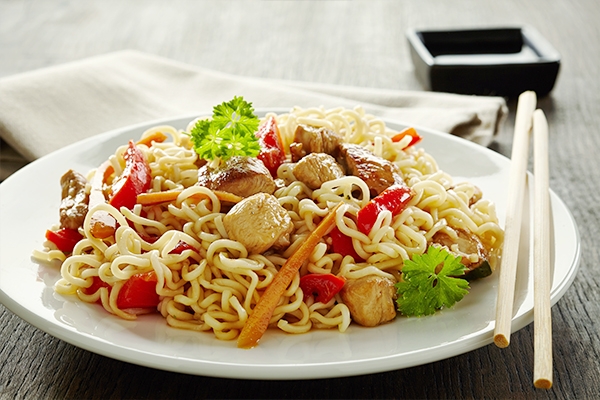Instant Noodles Never Fail. But Is It Healthy?

The World Instant Noodles Association (WINA) reported a startling statistic about instant noodle consumption in 2022: Indonesia has become the world's second-largest consumer of instant noodles, with 13.27 billion servings per year. This position is directly beneath China.
Long before this data, instant noodles began their journey in the land of cherry blossoms, Japan. Momofuku Ando, a Japanese-Taiwanese entrepreneur and founder of Nissin Food Products, invented instant noodles in 1958.

Why are Indonesians so fond of instant noodles? Everyone, regardless of age, enjoys it. The answer could be that, first, they are inexpensive and easy to implement. Eating food that can be prepared in three minutes or less is a viable option in today's hectic world.
Second, the flavor is incredible. MSG (monosodium glutamate) is what gives instant noodles their flavor. Chicken onion, chicken curry, meatballs, soto, and other flavors are available.
Third, it is widely available and has a long shelf life. Instant noodles are sold at roadside stands, department stores, and even restaurants.
Consuming instant noodles is a way for some people to unwind after a long day at work. Instant noodles with egg and chili peppers sound especially appealing in the midst of a rainy afternoon.
Instant noodles ingredients
When we buy instant noodles, we get the whole package. Wheat flour, water, salt, and cooking oil are combined to make noodles. They are seasoned with salt, flavor enhancers, and MSG.
The noodles are manufactured in a factory and are available in two varieties: packaged or cupped and boiled or fried. However, before they reach consumers, the noodles are steamed, dried, and packaged.
Unfortunately, this popular food has many pros and cons. Many people believe it is unhealthy because it is deficient in nutrition. However, its fans don't seem to mind because of its utility and delectable taste.
What approach should we take? Consuming instant noodles is not wrong. What matters is that it is done within reasonable limits. The negative effects of instant noodles will become apparent only if you consume them on a regular basis. Here's why:
1. Nutritional deficiency
Despite their delectable taste, instant noodles are devoid of nutrients. They are high in calories, sugar, and saturated fat. Meanwhile, they only have a few nutrients that the body needs, such as protein, fiber, and vitamins A, C, and B12. Instant noodles contain 4 grams of protein and 1 gram of fiber per serving.
Satiety can be caused by a lack of protein and fiber. However, do not use it to curb your appetite. Low-fiber foods can cause constipation, stomach pain, and a reduction in healthy gut bacteria.
The flour used to make instant noodles has been ground and bleached. They lose nutrients as a result of this process. So when you eat them, you are only consuming calories. Before drying, instant noodles are fried in saturated fatty acid-rich oil. Even though saturated fat is harmful to one's health, the noodles absorb it.
2. High sodium content
Have you ever felt thirsty after eating instant noodles even after finishing all of the broth? One of the side effects of the sodium in instant noodle seasoning is this. Don't be surprised if you develop hypertension, heart disease, stroke, kidney disease, or stomach cancer if you consume it frequently.
Per 100g serving, instant noodles contain 397-3,678 mg of sodium, sometimes even more. Sodium is an essential mineral for the human body. However, eating too much of it is bad for your health.
The intestines absorb up to 98% of this sodium intake. Excess sodium is absorbed by the kidneys and eliminated through the urine. Kidney function declines with age. As a result, excessive sodium consumption will cause a variety of health problems.
The WHO recommends 5 grams of sodium per day. Consuming more than one pack of instant noodles per day makes it difficult to stay within the recommended sodium intake limit. How many packs do you typically eat? Please be cautious.
3. MSG (monosodium glutamate)
The flavor of instant noodles appears to be unparalleled. You are not mistaken in your feelings. MSG is added to instant noodle seasoning to give it a savory flavor.
The Ministry of Health recommends a daily MSG intake limit of 120 milligrams per kilogram, or one teaspoon per day. Meanwhile, one serving of instant noodle seasoning contains 14.5-21% MSG.
Excess MSG consumption can harm organs such as the brain, liver, and heart. Excessive MSG consumption can cause headaches, nausea, high blood pressure, weakness, tense muscles, chest pain, palpitations, and skin redness. Some studies have also linked excessive MSG consumption to obesity and high blood pressure.
4. Contains preservatives
Some instant noodle brands claim to use no preservatives. However, this ingredient is commonly used to keep the noodles fresh and extend their shelf life. Tertiary butylhydroquinone (TBHQ) is a common preservative. This preservative is used in the food industry, with a recommended limit of 0.02% to avoid affecting consumer health.
Excessive TBHQ use can result in a variety of health issues, including ringing in the ears, vomiting, psychosis, dermatitis, asthma, and a decrease in estrogen levels in women.
What if you still want to eat it?

Isn't it clear? Consuming instant noodles on a regular basis demonstrates how low the quality of our food intake is. Protein, calcium, vitamin C, phosphorus, iron, niacin, and vitamin A intake will be significantly reduced in instant noodle lovers. On the other hand, they will consume more sodium and calories.
Consuming a bowl of instant noodles on occasion is not harmful if the rest of your diet is healthy and well-balanced. Even better, serve your noodles with vegetables and protein. Spinach, cabbage, and grated carrots are high in fiber. Proteins such as boiled or fried eggs, tofu, and cheese will also help your instant noodles to be more nutritious.
MSG can also be replaced in the seasoning with beef or chicken broth, various herbs, and salt. These substitute ingredients are less likely to cause allergies or other health problems.



